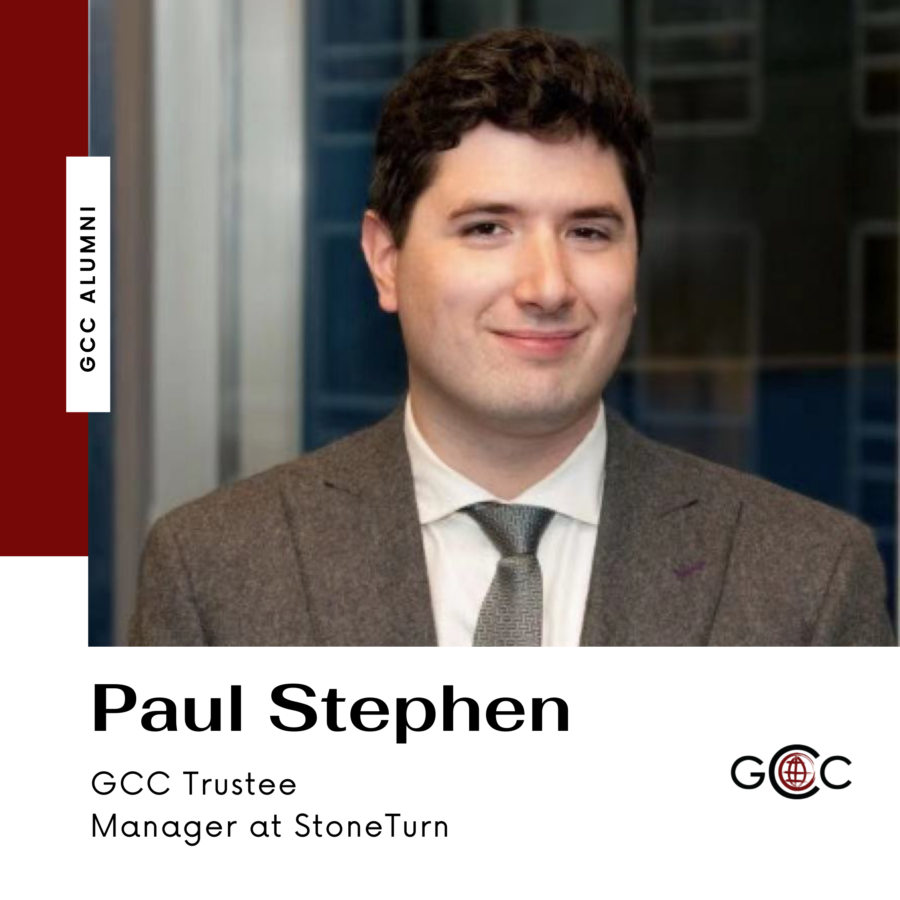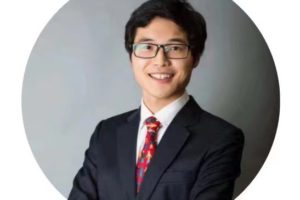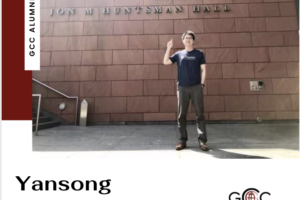Introduction
First, could you please give a short self-introduction to let us know about your background?
I grew up in Buffalo, New York, but went to college at GWU in Washington DC, and I’ve lived in New York City for the past seven years along with my wife, Diana, and our two cats.
It was at GWU that I first joined GCC in 2008, when some friends and I founded the GWU chapter together. After graduating college in 2012, I moved to Tianjin where I worked with GCC’s founder, Gavin Newton-Tanzer, on a start-up project focused on education. I moved to Beijing in 2013, where I joined an architecture firm working as a translator and marketing director. This was an interesting role as it gave me a front seat view of China’s real estate industry. I spent much of that year traveling to various second and third-tier cities to visit construction sites, translating for the American architects and the Chinese clients.
While working in Beijing, I was offered a part-time job as a translator for China National Geographic, helping them translate articles about China’s vast and endlessly interesting geography for publication abroad. Through this role, I became fascinated with translation, and decided to enroll in a Chinese-English Translation master’s program at NYU. Hence, I moved to New York in the Summer of 2014, and have lived here ever since. When I arrived in New York, I began by working at Bloomingdales and eventually found a role as an intern at the Asia Society. In 2016, I founded a translation company with some of my NYU classmates.
As my main career, though, I’ve worked in the consulting industry since 2015, first at Navigant (now called Guidehouse) and currently at StoneTurn. In this field I specialize in compliance and investigations, particularly relating to anti–money laundering, anti–bribery and corruption, and sanctions concerns. I ended up joining the GCC Board of Trustees in January 2018, where I continue to serve.
Maybe the thing I love most about China is Chinese cinema, specifically the works of “6th Generation” directors like Jia Zhangke and Lou Ye.
GCC
From your Linkedin profile, we noticed that you are the founding member and executive board member of GCC-George Washington University chapter. How did you know about GCC initially and what made you decide to found the GCC- GWU chapter?
I initially found out about GCC at the start of my freshman year from a classmate named Cui Chen, who had been assigned as my Chinese language partner. She told me she’d heard about some Chinese club that was spreading to other colleges. The more I found out about GCC, the more perfect it seemed for my interest in China and my desire to connect with Chinese classmates; none of us wanted to miss out on being part of GCC, so we got a few friends together and met in the library to found our chapter. At the time, the university did not allocate any funds to us, so we had to cobble together free events held in public spaces until we could formally register as a club the next semester. But we quickly grew after that.
We noticed that you joined GCC in 2008, which was in your freshman year at George Washington University. Do you think GCC made your college life different? Could you please share your experience in GCC? What was the most memorable experience?
It’s difficult to imagine now, but at that time, in 2008, there were only a relatively small number of overseas Chinese students at GWU. The number of Chinese students exploded within a year, though, and began to grow exponentially after that. This fundamentally changed the landscape of higher education in the United States. It also coincided with an extremely sharp increase in American students’ interest in studying Chinese and traveling to China. GCC was perfectly positioned at the center of these two complementary forces, and it resulted in a period of unparalleled growth and expansion for the organization, roughly from 2008 through 2013, with the number of members and chapters nearly doubling for several years in a row.
At a local level, GCC really provided a unique opportunity for American students and Chinese students to connect with each other. Then, as now, there were sort of invisible lines dividing the American students from the overseas students—we were separated by language barriers and had different friend groups—but GCC was essentially the only platform whereby these two groups could come together, unlike other organizations (such as CSSA) that are generally focused only on Chinese students. One thing I’ve noticed over the years is that GCC attracts a specific subset of American and Chinese students who are very outgoing and are intrinsically interested in engaging in cross-cultural communication and experiences.
I always emphasize that the local chapter level is the most critical and vital component of the organization. There are countless memorable experiences I had while serving on the GCC GWU eboard, but perhaps the most memorable experience was when our chapter hosted Chai Ling as a guest speaker; Chai Ling is extremely controversial due to her status as a political dissident, and this event generated a lot of controversy with other Chinese student organizations on campus and even resulted in the Chinese embassy pressuring us to cancel the event. But we went forward regardless, steadfast in our commitment to academic freedom, and the event was perhaps the most well-attended in the history of our chapter, at that point. This illustrates yet another unique advantage GCC offers as a completely non-partisan organization: we are willing and encouraged to explore bold and controversial ideas and topics that our members might not otherwise have access to. This is the only way to truly offer unique insights into Sino-US relations.
How did your experience in GCC help you in your later career? And how did you transfer your skills and knowledge learned at GCC into your own professional work?
GCC was instrumental in every facet of my post-college career. Firstly, it provided a robust network of professionals working in diverse fields who were able to offer career advice and opportunities; this vast alumni network remains our greatest strength. Secondly, GCC was the primary way I was able to learn Chinese, which ended up being the main foundation of all my later professional work. On top of that, I learned invaluable lessons about working with diverse teams across different cultures, which is vital to everyone working in the modern economy.
Internship Experience
You had multiple exciting internship experiences and they are related to marketing, translating, and consulting. What are some skills that you think are essential to those different internships?
The common theme across all my internship experiences has been my Chinese language ability and my strength in working with diverse teams with colleagues from China, the US, and elsewhere—both of these things were a direct result of my undergraduate experiences with GCC. Finding great internship opportunities was essentially just a matter of “showing up”, even when I was busy with grad school work, I tried to go to as many events at places like the Asia Society as possible; the more active one is, the more opportunities naturally arise, even in the least likely places.
Could you please share one of your internship experiences? What was your biggest takeaway from this internship?
My most interesting internship experience was working at the Asia Society in 2014 – 2015, where I was tasked with writing subtitles for short films they were releasing. This allowed me to continue to develop my translation skills, and I got to meet a lot of great people there and attend interesting events. One of the most exciting fields of translation I’ve been involved with has been subtitling for Chinese films: while at NYU I ended up subtitling movies for some very talented up-and-coming young Chinese filmmakers there. This was as a direct result of my work at the Asia Society.
Current Job
Currently, you are working at StoneTurn. What does a typical day look like for you? What is the biggest challenge you’ve faced in work?
My work at StoneTurn primarily focuses on investigations. Essentially, the team I work with conducts investigations into individuals and entities all over the world, often to support litigation or as due diligence before an executive is hired or a corporate merger takes place, or to trace assets such as vehicles, real estate, and art that might be the subject of a dispute. I find this work to be endlessly fascinating, as it requires outside-the-box thinking in order to uncover otherwise hidden information that might be relevant for our clients; this can include looking for obscure court cases and records, searching through social media profiles, or combing through news articles.
Perhaps the biggest challenge is having to learn about industries that I’ve never had experience with before, but this is also the most interesting element. This is true for anyone working in the consulting field, even if not in investigations, whenever there’s a new project it’s an opportunity to dive into a totally new world, whether that be banking, retail, mining, tourism, entertainment, or even fashion and art.
Do you have any other advice for college students or even recent graduates?
I always give the same advice: just keep moving forward and opportunities will find you. I think it was Woody Allen that said ‘99% of life is just showing up’, and I’ve found that to be totally true. The more events you attend, even things like art openings or film screenings, the more opportunities will naturally arise. The goal is not to go out and “network”—I hate that word—but rather to find things that interest you and participate as much as you can, you will inevitably meet great people and the opportunities will follow from the relationships that naturally form.
The important thing to keep in mind is flexibility and adaptivity, very few people end up doing exactly what they set out to do when they graduate college. When I moved to New York I had no idea what I was going to end up doing, I was working at Bloomingdales and studying translation, but now I work in the consulting industry. I don’t think I could have taken this route if I’d planned to, but that’s just how it went. I have no law degree or background in accounting or even in business, but the firm that initially hired me in 2015 needed a Chinese speaker and the hiring manager was a big fan of the Asia Society, even though I was just working there as a volunteer. Again, it’s important to just be active and involved with the world around you, and always be moving forward, ready to seize new opportunities as they appear, even if they are things you’ve never thought of before.








